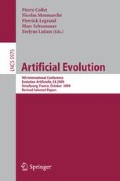Abstract
This paper studies how evolutionary algorithms (EA) scale with growing genome size, when used for similarity-based clustering. A simple EA and EAs with problem-dependent knowledge are experimentally evaluated for clustering up to 100,000 objects. We find that EAs with problem-dependent crossover or hybridization scale near-linear in the size of the similarity matrix, while the simple EA, even with problem-dependent initialization, fails at moderately large genome sizes.
Access this chapter
Tax calculation will be finalised at checkout
Purchases are for personal use only
Preview
Unable to display preview. Download preview PDF.
References
Alba, E., Tomassini, M.: Parallelism and evolutionary algorithms. IEEE Trans. Evol. Comput. 6(5), 443–462 (2002)
Bach, S.R.: A scalability study of evolutionary algorithms for clustering. Diploma thesis: University of Karlsruhe, Germany (2009), urn:nbn:de:swb:90-114447
Carvalho, P.M.S., Ferreira, L.A.F.M., Barruncho, L.M.F.: On spanning-tree recombination in evolutionary large-scale network problems–application to electrical distribution planning. IEEE Trans. Evol. Comput. 5(6), 623–630 (2001)
Chen, Y.p., Goldberg, D.E.: Convergence time for the linkage learning genetic algorithm. Evolutionary Computation 13(3), 279–302 (2005)
Christou, I.T., Zakarian, A., Liu, J.M., Carter, H.: A two-phase genetic algorithm for large-scale bidline-generation problems at delta air lines. Interfaces 29(5), 51–65 (1999)
Cowling, P., Kendall, G., Han, L.: An investigation of a hyperheuristic genetic algorithm applied to a trainer scheduling problem. In: 2002 Congress on Evolutionary Computation, vol. 2, pp. 1185–1190. IEEE, Los Alamitos (2002)
Deb, K., Pal, K.: Efficiently solving: A large-scale integer linear program using a customized genetic algorithm. In: Deb, K., et al. (eds.) GECCO 2004. LNCS, vol. 3102, pp. 1054–1065. Springer, Heidelberg (2004)
Demir, G.N., Uyar, A.Ş., Gündüz-Öğüdücü, Ş.: Multiobjective evolutionary clustering of web user sessions: A case study in web page recommendation. Soft Computing 14(6), 579–597 (2009)
Falkenauer, E.: Genetic Algorithms and Grouping Problems. Wiley, Chichester (1998)
Gasvoda, J., Ding, Q.: A genetic algorithm for clustering on very large datasets. In: Nygard, K.E. (ed.) 16th Int. Conf. on Comp. App. Ind. Eng., pp. 163–167. International Society for Computers and Their Applications (ISCA) (2003)
Gower, J.C., Ross, G.J.S.: Minimum spanning trees and single linkage cluster analysis. Applied Statistics 18(1), 54–64 (1969)
Gündüz-Öğüdücü, Ş., Uyar, A.Ş.: A graph based clustering method using a hybrid evolutionary algorithm. WSEAS Trans. on Mathematics 3(3), 731–736 (2004)
Handl, J., Knowles, J.: An Evolutionary Approach to Multiobjective Clustering. IEEE Trans. Evol. Comput. 11(1), 56–76 (2007)
Hart, W.E., Krasnogor, N., Smith, J. (eds.): Recent Advances in Memetic Algorithms. Studies in Fuzziness and Soft Computing, vol. 166. Springer, Heidelberg (2005)
Hruschka, E.R., Campello, R.J.G.B., Freitas, A.A., de Carvalho, A.C.P.L.F.: A survey of evolutionary algorithms for clustering. IEEE Trans. Systems, Man, and Cybernetics Part C 39(2), 133–155 (2009)
Jie, L., Xinbo, G., Li-cheng, J.: A GA-based clustering algorithm for large data sets with mixed and categorical values. In: 5th Int. Conf. on Comp. Intel. Mult. App., pp. 102–107. IEEE, Los Alamitos (2003)
Kargupta, H., Bandyopadhyay, S.: Further experimentations on the scalability of the GEMGA. In: Eiben, A.E., Bäck, T., Schoenauer, M., Schwefel, H.-P. (eds.) PPSN 1998. LNCS, vol. 1498, pp. 315–324. Springer, Heidelberg (1998)
Korkmaz, E.E.: A two-level clustering method using linear linkage encoding. In: Runarsson, T.P., Beyer, H.-G., Burke, E.K., Merelo-Guervós, J.J., Whitley, L.D., Yao, X. (eds.) PPSN 2006. LNCS, vol. 4193, pp. 681–690. Springer, Heidelberg (2006)
von Laszewski, G.: Intelligent structural operators for the k-way graph partitioning problem. In: 4th Int. Conf. on Gen. Alg., pp. 45–52. Morgan Kaufmann, San Francisco (1991)
Pelikan, M., Sastry, K., Goldberg, D.E.: Sporadic model building for efficiency enhancement of the hierarchical BOA. Genetic Programming and Evolvable Machines 9(1), 53–84 (2008)
Schmeck, H., Kohlmorgen, U., Branke, J.: Parallel implementations of evolutionary algorithms. In: Zomaya, A., Ercal, F., Olariu, S. (eds.) Solutions to Parallel and Distributed Computing Problems, pp. 47–68. Wiley, Chichester (2001)
Surry, P.D., Radcliffe, N.J.: Inoculation to initialise evolutionary search. In: Fogarty, T.C. (ed.) AISB-WS 1996. LNCS, vol. 1143, pp. 269–285. Springer, Heidelberg (1996)
Author information
Authors and Affiliations
Editor information
Editors and Affiliations
Rights and permissions
Copyright information
© 2010 Springer-Verlag Berlin Heidelberg
About this paper
Cite this paper
Bach, S.R., Uyar, A.Ş., Branke, J. (2010). Improving the Scalability of EA Techniques: A Case Study in Clustering. In: Collet, P., Monmarché, N., Legrand, P., Schoenauer, M., Lutton, E. (eds) Artifical Evolution. EA 2009. Lecture Notes in Computer Science, vol 5975. Springer, Berlin, Heidelberg. https://doi.org/10.1007/978-3-642-14156-0_2
Download citation
DOI: https://doi.org/10.1007/978-3-642-14156-0_2
Publisher Name: Springer, Berlin, Heidelberg
Print ISBN: 978-3-642-14155-3
Online ISBN: 978-3-642-14156-0
eBook Packages: Computer ScienceComputer Science (R0)

